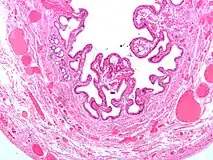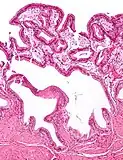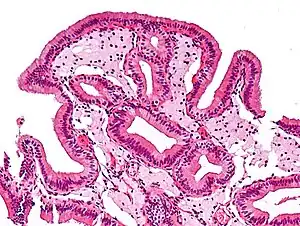Cholesterolosis of gallbladder
| Cholesterolosis of gallbladder | |
|---|---|
| Other names: Strawberry gallbladder, gallbladder cholesterolosis | |
 | |
| Micrograph of cholesterolosis of the gallbladder, with an annotated foam cell. H&E stain. | |
| Specialty | Pathology, general surgery |
Cholesterolosis of the gallbladder, also known as strawberry gallbladder, is a change in the gallbladder wall due to excess cholesterol.[1]
The name strawberry gallbladder comes from the typically stippled appearance of the mucosal surface on gross examination, which resembles a strawberry. Cholesterolosis results from abnormal deposits of cholesterol esters in macrophages within the lamina propria (foam cells) and in mucosal epithelium. The gallbladder may be affected in a patchy localized form or in a diffuse form. The diffuse form macroscopically appears as a bright red mucosa with yellow mottling (due to lipid), hence the term strawberry gallbladder. It is not tied to cholelithiasis (gallstones) or cholecystitis (inflammation of the gallbladder).[2]
.png.webp) Cut-opened specimen of gallbladder (strawberry) shows multiple polyps
Cut-opened specimen of gallbladder (strawberry) shows multiple polyps Micrograph of cholesterolosis of the gallbladder
Micrograph of cholesterolosis of the gallbladder Micrograph of cholesterolosis of the gallbladder
Micrograph of cholesterolosis of the gallbladder Micrograph of cholesterolosis of the gallbladder
Micrograph of cholesterolosis of the gallbladder
See also
References
- ↑ Strawberry gallbladder - cancerweb.ncl.ac.uk.
- ↑ "Cholesterolosis of the Gall Bladder". Archived from the original on 2012-10-26. Retrieved 2022-03-12.
Further reading
- Izzo L, Boschetto A, Brachini G, et al. (2001). "["Strawberry" gallbladder: review of the literature and our experience]". Il Giornale di Chirurgia (in italiano). 22 (1–2): 33–6. PMID 11272434.
External links
| Classification |
|---|